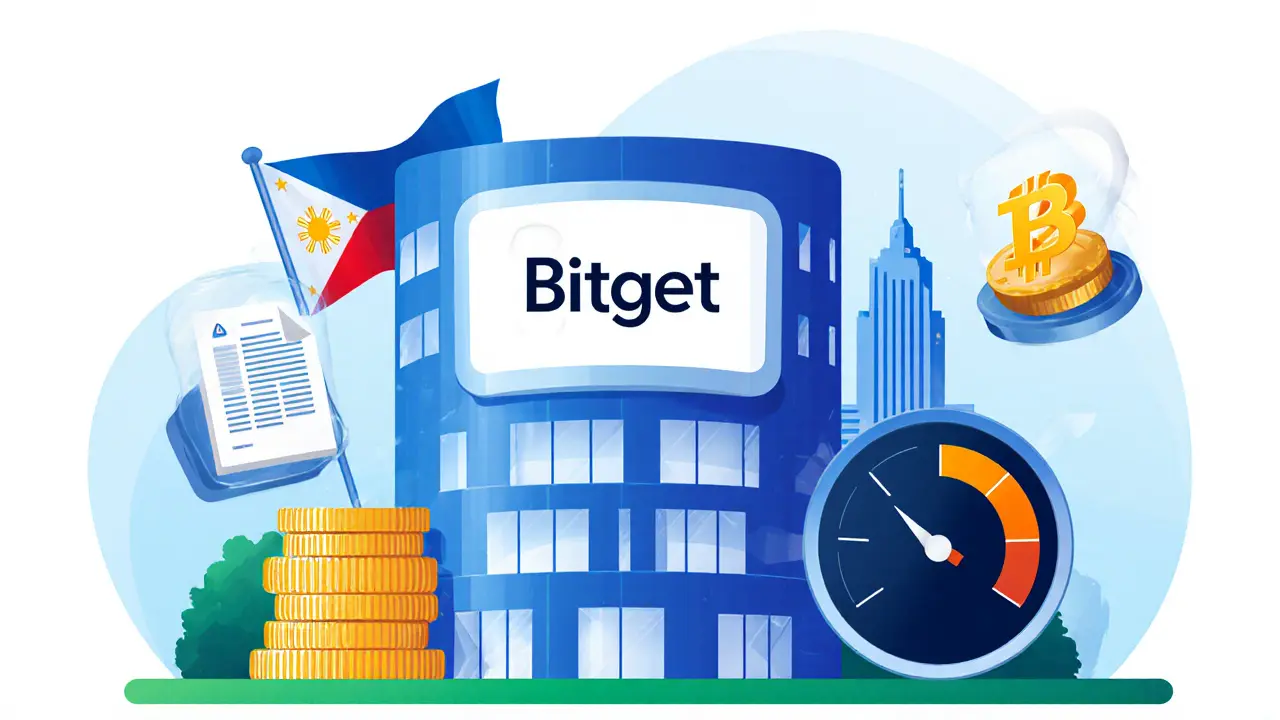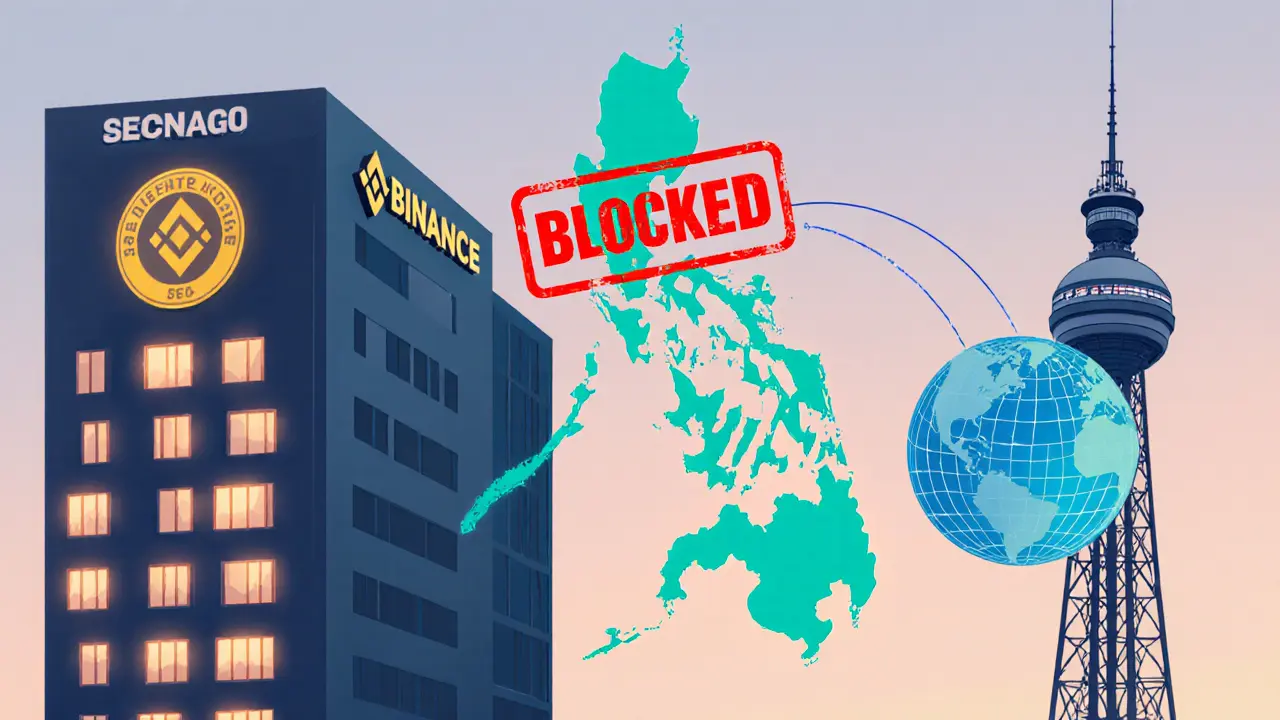Philippine Crypto Exchange Compliance Checker
Select an exchange to view details.
Binance
BlockedBlocked since March 2024 due to lack of Philippine license. Users may face legal risks using VPNs to access.
Bitget
Non-compliantOperating without local license. Subject to CASP penalties if not registered with minimum capital and office.
PDAX
CompliantLicensed under CASP framework with required capital and local presence.
Coins.ph
CompliantFully licensed under CASP with fiat-on-ramp integration.
For anyone swapping Bitcoin, Ethereum or any other token in the Philippines, the headlines about a Binance Philippines ban are more than just news-they’re a direct call to action. Since the Securities and Exchange Commission (SEC) blocked Binance in March 2024 and rolled out a brand‑new Crypto Asset Service Provider (CASP) framework in May 2025, both Binance and Bitget find themselves in a tight spot. This guide breaks down what the rules are, why they matter, and how Filipino traders can stay on the right side of the law while still keeping their crypto game going.
What the SEC’s Ban on Binance Looks Like
Binance is the world’s largest cryptocurrency exchange by trading volume, offering spot, futures and lending services to millions of users worldwide. In the Philippines, the SEC issued a formal warning in November 2023, stating that Binance was operating without a domestic license. By March 2024 the regulator teamed up with the National Telecommunication Commission (NTC) to block the exchange’s website and mobile app at the network level. The block was not just a technical glitch; the SEC publicly warned anyone promoting or facilitating Binance trades in the country could face criminal liability.
The enforcement timeline was crystal clear: users had 90 days to withdraw funds, after which the platform would be completely inaccessible from Philippine IP addresses. Despite the block, many traders still reported being able to log in through VPNs, a practice the SEC has labeled a “legal gray area” that could expose users to fines or prosecution.
How the New CASP Framework Affects Bitget
While Binance made headlines, the Crypto Asset Service Provider (CASP) framework is the Philippines’ first comprehensive set of rules for cryptocurrency exchanges, wallet providers and related service providers applies to every platform that serves Filipino customers, including Bitget.
Bitget is a global crypto derivatives exchange that offers futures contracts on major coins and a spot trading platform. Although the SEC’s August 2025 advisory listed ten exchanges-OKX, Bybit, KuCoin, Kraken among them-Bitget was not named explicitly. The omission does not mean Bitget is safe; the CASP rules are universal. Any exchange without a registered Philippine subsidiary, a minimum paid‑up capital of 100million pesos (about US$1.8million), and a physical office on the islands is now in violation.
The penalties are steep: violations can attract fines from 50,000 to 10million pesos per breach, plus a daily penalty of 10,000 pesos for continued non‑compliance. For a platform the size of Bitget, the financial hit could quickly exceed the cost of establishing a local entity, which explains why many exchanges have delayed registration.
Enforcement Actions and What They Mean for Traders
The SEC’s approach combines two levers: blocking technical access and imposing monetary sanctions. The technical block, executed with help from the NTC, forces the ISP to return a “site unreachable” message when users try to load Binance’s domain. Financial penalties target the exchange’s balance sheet, discouraging operators from ignoring licensing requirements.
For traders, the practical fallout is straightforward:
- Asset safety: If an exchange is blocked, you risk being unable to move funds out before the shutdown deadline.
- Legal exposure: Acting as a promoter or “salesperson” for a banned platform can lead to criminal charges under the SEC’s broad interpretation of “facilitator.”
- Financial loss: Unlicensed platforms are not covered by any local investor protection scheme, so any loss from a hack or insolvency is yours alone.

VPNs: The Workaround That Comes With Risks
Since the block, VPN providers have marketed “access to Binance in the Philippines” as a premium service. A VPN encrypts your internet traffic and routes it through a server in another country, effectively disguising your IP address. While this technology is legal in most jurisdictions, using it to evade a government‑issued financial restriction can be construed as an illegal circumvention.
Potential consequences include:
- Being flagged by the SEC for “unauthorized access” and facing fines.
- Having your crypto assets frozen if the exchange detects VPN usage and decides to comply with local orders.
- Compromising security if you choose a low‑quality VPN that logs traffic, exposing you to data leaks.
For those who still opt to use a VPN, the safest practice is to keep balances low, withdraw to a personal wallet, and avoid any promotional activity that could be seen as endorsing the banned platform.
Comparison: Binance vs. Bitget - Regulatory Status in the Philippines
| Aspect | Binance | Bitget |
|---|---|---|
| Operational status | Blocked since March2024 | Operating without local license (potentially non‑compliant) |
| SEC enforcement action | Website and API blocked; promoters criminally liable | Subject to CASP penalties if not registered |
| Minimum capital requirement | Not met (global entity) | Not met (global entity) |
| Physical office in Philippines | None | None |
| Potential fines | Up to 10millionPHP per violation | Up to 10millionPHP per violation |
Practical Steps for Filipino Crypto Users
Whether you’re a seasoned trader or just started last month, here’s a checklist to keep you on the right side of the law while still accessing the crypto markets you love.
- Audit your accounts: Identify any balances you hold on Binance or Bitget. Transfer them to a self‑custodied wallet (e.g., Ledger, Trust Wallet) before any enforcement deadline.
- Verify licensing: Only use exchanges that have a registered Philippine corporation, a printed address, and a clear capital declaration. The SEC publishes a list of approved CASPs on its website.
- Stay informed: Follow official SEC advisories on social media or via their mailing list. Regulations can change quickly, and the SEC often issues 30‑day notice periods before new bans.
- Limit promotional activity: Do not accept commissions for bringing new users onto a banned platform. Even sharing a referral link can be interpreted as “facilitating” illegal activity.
- Consider local alternatives: Platforms like PDAX and Coins.ph have secured CASP licenses and offer fiat‑on‑ramp services directly tied to Philippine banks.
- Be cautious with VPNs: If you must use a VPN for research purposes, keep it short‑lived, disable it when moving funds, and never use it to place trades on a prohibited exchange.
What’s Next for Crypto Exchanges in the Philippines?
The SEC’s May2025 circulars are just the beginning. Analysts predict three possible scenarios over the next 12‑18 months:
- Full compliance drive: All major international exchanges either register locally or withdraw from the market. This would create a more regulated but possibly less competitive landscape.
- Selective enforcement: The SEC focuses on high‑volume platforms like Binance and Bitget, while allowing smaller, niche players to operate under lighter oversight.
- Regional coordination: Following Thailand and Indonesia’s recent moves, Southeast Asian regulators could form a joint task force, harmonizing licensing requirements across borders. That would make cross‑border compliance easier but raise the bar for entry.
For traders, the safest bet is to gravitate toward exchanges that already meet the CASP criteria. Those platforms will be less likely to face sudden shutdowns, and they provide a clearer path for legal recourse if something goes wrong.

Frequently Asked Questions
Is using a VPN to access Binance legal in the Philippines?
Technically, VPNs are legal tools for privacy, but using them to bypass a government‑issued ban on a financial service can be considered illegal. The SEC may treat VPN‑facilitated trading as a violation and impose fines.
What happens to my Binance funds after the 90‑day withdrawal window?
If you haven’t moved your assets before the deadline, you could lose access to your account. The SEC may freeze the account, and Binance could be unable to process withdrawals because its platform is blocked at the ISP level.
Does Bitget face the same fines as Binance?
Yes. Under the CASP framework, any exchange operating without a Philippine license is subject to the same penalty range-50,000 to 10millionPHP per violation and daily fines for continued non‑compliance.
Which local exchanges are fully compliant with the new CASP rules?
As of October2025, PDAX, Coins.ph, and the newly‑licensed Binance Philippines (a separate entity from the global Binance) have met the capital, office and reporting requirements laid out in Memorandum Circular No.4 and No.5.
Can I still trade crypto futures on Bitget if I’m a Filipino resident?
Technically you can, but doing so without a licensed local entity violates the CASP framework. Continuing to trade could expose you to regulatory penalties and may result in account freezing.


Author
Ronan Caverly
I'm a blockchain analyst and market strategist bridging crypto and equities. I research protocols, decode tokenomics, and track exchange flows to spot risk and opportunity. I invest privately and advise fintech teams on go-to-market and compliance-aware growth. I also publish weekly insights to help retail and funds navigate digital asset cycles.